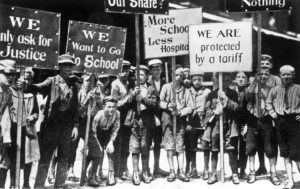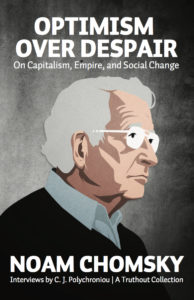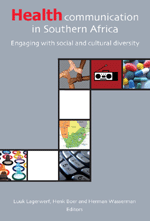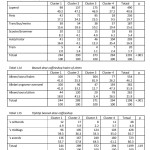Kunst is Lang ~ Patricia Kaersenhout
De beeldende kunst is als een altijd doorstomende trein die zich een weg baant langs stromingen, niches, uitspattingen en extravaganza. Het tempo van afwisselingen en opkomende kunstenaars is hoog, de zendtijd voor hedendaagse kunst bescheiden. In de uitzending van Kunst is lang zoekt Luuk Heezen samen met mister Motley de verdieping op met een hedendaagse kunstenaar. Een gesprek over het werk, over vreemde ideeën, over de vooroordelen binnen kunst, en over het (doodnormale) dagelijkse leven van de kunstenaar.
Patricia Kaersenhout is een Nederlandse visueel kunstenaar en cultureel activist. Ze studeerde sociale wetenschappen aan Amstelhorn Amsterdam en beeldende kunst aan de Gerrit Rietveld Academie. Haar werk onderzoekt sociale onzichtbaarheid als gevolg van de Afrikaanse Diaspora. Ook richt ze zich op het kolonialisme in relatie tot haar eigen opgroeien binnen een West-Europese cultuur. De rode draad in haar werk is een onderzoek naar de Afrikaanse Diaspora, die ze in verband brengt met de geschiedenis van de slavernij, racisme, feminisme en seksualiteit.
Gast: Patricia Kaersenhout
Streamer: Elsemarijn Bruys
Kunstenaarsvideo: ZaZaZoZo
Blueprint For A Progressive US: A Dialogue With Noam Chomsky And Robert Pollin

1902, Philadelphia, Pennsylvania, USA — Child labor strike in Philadelphia, Pennsylvania. Photograph 1902 — Image by © Bettmann/CORBIS
This is the first part of a wide-ranging interview with world-renowned public intellectuals Noam Chomsky and Robert Pollin. The next installment will appear on October 24.
Not long after taking office, it became evident that Donald Trump had engaged in fraudulent populism during his campaign. His promise to “Make America Great Again” has been exposed as a lie, as the Trump administration has been busy extending US military power, exacerbating inequality, reverting to the old era of unregulated banking practices, pushing for more fuel fossil drilling and stripping environmental regulations.
In the Trump era, what would an authentically populist, progressive political agenda look like? What would a progressive US look like with regard to jobs, the environment, finance capital and the standard of living? What would it look like in terms of education and health care, justice and equality? In an exclusive interview with C.J. Polychroniou for Truthout, world-renowned public intellectuals Noam Chomsky and Robert Pollin tackle these issues. Noam Chomsky is professor emeritus of linguistics at MIT and laureate professor in the department of linguistics at the University of Arizona. Robert Pollin is distinguished professor of economics and co-director of the Political Economy Research Institute at the University of Massachusetts at Amherst. Their views lay the foundation for a visionary — yet eminently realistic — progressive social and economic order for the United States.
C.J. Polychroniou: Noam, the rise of Donald Trump has unleashed a rather unprecedented wave of social resistance in the US. Do you think the conditions are ripe for a mass progressive/socialist movement in this country that can begin to reframe the major policy issues affecting the majority of people, and perhaps even challenge and potentially change the fundamental structures of the US political economy?
Noam Chomsky: There is indeed a wave of social resistance, more significant than in the recent past — though I’d hesitate about calling it “unprecedented.” Nevertheless, we cannot overlook the fact that in the domain of policy formation and implementation, the right is ascendant, in fact some of its harshest and most destructive elements [are rising].
Nor should we overlook a crucial fact that has been evident for some time: The figure in charge, though often ridiculed, has succeeded brilliantly in his goal of occupying media and public attention while mobilizing a very loyal popular base — and one with sinister features, sometimes smacking of totalitarianism, including adoration of The Leader. That goes beyond the core of loyal Trump supporters…. [A majority of Republicans] favor shutting down or at least fining the press if it presents “biased” or “false news” — terms that mean information rejected by The Leader, so we learn from polls showing that by overwhelming margins, Republicans not only believe Trump far more than the hated mainstream media, but even far more than their own media organ, the extreme right Fox news. And half of Republicans would back postponing the 2020 election if Trump calls for it.
It is also worth bearing in mind that among a significant part of his worshipful base, Trump is regarded as a “wavering moderate” who cannot be fully trusted to hold fast to the true faith of fierce White Christian identity politics. A recent illustration is the primary victory of the incredible Roy Moore in Alabama despite Trump’s opposition. (“Mr. President, I love you but you are wrong,” as the banners read). The victory of this Bible-thumping fanatic has led senior party strategists to [conclude] “that the conservative base now loathes its leaders in Washington the same way it detested President Barack Obama” — referring to leaders who are already so far right that one needs a powerful telescope to locate them at the outer fringe of any tolerable political spectrum.
The potential power of the ultra-right attack on the far right is [illustrated] by the fact that Moore spent about $200,000, in contrast to his Trump-backed opponent, the merely far-right Luther Strange, who received more than $10 million from the national GOP and other far-right sources. The ultra-right is spearheaded by Steve Bannon, one of the most dangerous figures in the shiver-inducing array that has come to the fore in recent years. It has the huge financial support of the Mercer family, along with ample media outreach through Breitbart news, talk radio and the rest of the toxic bubble in which loyalists trap themselves.
In the most powerful state in history, the current Republican Party is ominous enough. What is not far on the horizon is even more menacing.
Read more
The Future Of Europe And The New World Disorder: An Interview With Political Economist C.J. Polychroniou
 Since the outbreak of the euro crisis, which was directly linked to the global financial crisis that erupted in 2007-08, Europe has been experiencing a host of contradictory trends and developments, which include efforts to contain the spread of systemic risk in the financial sector while the debt crisis remains unresolved for several eurozone member states, and calls for the creation of a European pillar of social rights while neoliberalism reigns supreme in EU’s economic policy agenda. In the meantime, a wave of extreme nationalism and xenophobia have spread in several European countries, challenging in the process not just globalization, but the foundation of an open, liberal society.
Since the outbreak of the euro crisis, which was directly linked to the global financial crisis that erupted in 2007-08, Europe has been experiencing a host of contradictory trends and developments, which include efforts to contain the spread of systemic risk in the financial sector while the debt crisis remains unresolved for several eurozone member states, and calls for the creation of a European pillar of social rights while neoliberalism reigns supreme in EU’s economic policy agenda. In the meantime, a wave of extreme nationalism and xenophobia have spread in several European countries, challenging in the process not just globalization, but the foundation of an open, liberal society.
Yet it’s not just the state of Europe that raises concerns about the future political and social order. As political economist C.J. Polychroniou points out in this interview, in the US, Trump’s militaristic attitude and jingoistic mindset puts the world on a very dangerous path, adding extra pressure to regions already beset by conflict and creating potential conditions not only for a renewed arms race, but for the actual use of nuclear weapons. Polychroniou has taught and worked in universities and research centers in Europe and the United States, and is the author of the recently published book Optimism Over Despair: On Capitalism, Empire, and Social Change, a collection of interviews with Noam Chomsky that appeared originally in Truthout and have been published by Haymarket Books in the US and Penguin Books in the rest of the English-speaking world.
Alexandra Boutri and Marcus Rolle: C.J., let’s start with developments in Europe: Brexit, Catalonia independence, meteoric rise of extreme right in Germany, illiberal democracies in Hungary, Poland and elsewhere, and the ongoing crisis in Greece. Is Europe in crisis?
C.J. Polychroniou: There is no question that Europe is facing severe challenges these days on several fronts that can affect the future of the continent on the whole. Brexit remains something of a conundrum; the push for independence in Catalonia is probably a very bad idea (although Catalans should have the “right to decide” on their future); the presence of 90 Alternative für Deutschland (AfD) politicians in the Bundestag is yet the strongest indication that the far right’s views have become quite acceptable among a growing segment of the German population, and the specter of illiberal democracy is haunting Europe. Indeed, I would go so far as to say that it is highly debatable whether or not Europe’s road to integration can proceed any more the way it has over the last 20 or so years.
The future of Europe is definitely one of multispeed and multitier, although President Jean-Claude Juncker, in his State of the Union Address in Brussels on September 13, made the case for a more united, stronger and democratic Europe, which includes an all-powerful president and an EU army, while an even far more impressive and comprehensive plan for a “profound transformation” of Europe was laid out by French president Emmanuel Macron at a speech he gave at Sorbonne University in Paris on September 26. Macron’s vision has the potential to turn Europe into the center of the world, but it is most unlikely that Germans would go along with some of his key ideas, such as creating a centralized eurozone budget and having a European finance minister.
Yet, these are precisely the things that are needed to revamp Europe as the specter of another euro crisis is a distinct possibility in the near future. In contrast to what many seem to believe, the euro crisis is not over and it can be reignited without any notice. Take, for instance, the issue of public debt. In Italy, it stands over 130 percent, while France’s public debt rose to the highest level in the first few months of 2017, reaching close to 100 percent of GDP. Moreover, Italy’s banking crisis remains unresolved, and Europe’s banking system in general remains quite fragile. As such, the next financial crisis could crash those economies, and that would mean a euro crisis 10 times bigger than the one experienced between 2010-2013. In fact, I dare say that a crisis in Italy — the eurozone’s third largest economy — is waiting to happen. In the meantime, you have central banks in Europe embarking on what is called the “Great Unwind” — the winding-down of quantitative easing programs that have sustained the continent’s economies, financial markets and banking systems since the outbreak of the euro crisis. What happens next is anyone’s guess. Will this development put a brake on EU economic boost? Most economists are worrying that it will. And what would happen if Europe went into a recession? Extreme nationalism and fraudulent populism, xenophobia and authoritarianism will surely be further strengthened. Read more
Greece and Economic Recovery: Fake News in Action
 Ten years ago, the implosion of Lehman Brothers ignited a financial crisis whose impact and effects were felt virtually across the globe as banks and financial institutions everywhere that were exposed to subprime lending, formed part of a long chain of complicated and interconnected derivatives, and partook freely in Wall Street shenanigans.
Ten years ago, the implosion of Lehman Brothers ignited a financial crisis whose impact and effects were felt virtually across the globe as banks and financial institutions everywhere that were exposed to subprime lending, formed part of a long chain of complicated and interconnected derivatives, and partook freely in Wall Street shenanigans.
In Europe, the global financial crisis that started in the United States did not reach shore until late 2009, and the first victim was the land that gave birth to democracy and laid the foundations for the emergence of Western civilization.
Enter Greece and an ongoing debt drama, with catastrophically spectacular economic, social, and political ramifications, that has no end in sight.
Indeed, now into its eighth year, Greece remains entirely dependent on international bailouts (three bailouts involving the European Union and the International Monetary Fund have been arranged since 2010), has lost a quarter of its GDP with no realistic expectations of recovering it for decades to come, experiences unemploymentlevels which have oscillated between a high 27.8 percent (in July 2013) and a low 21.2 percent (in June 2017), and has seen the standard of living decline to 1960s levels.
Worse, Greece’s debt-to-GDP ratio has exploded since the start of the bailout programs, rising from 128 percent in 2010 to over 185 percent in 2017, and, with no debt relief in sight, the small Mediterranean nation has become truly a permanent debt colony inside the world’s richest region. In the meantime, a mass exodus of young and educated people has been in motion for several years now (youth unemployment rate in Greece stands currently at 43.3 percent), a process that is bound to have long-term effects on demographic trends and a significant impact on future economic developments.
Nonetheless, the story line advanced these days from Athens, courtesy of a pseudo-leftist government that has not only reneged on every one of its promises to the Greek citizens since coming to power, but has ended up reinforcing the neoliberal agenda of the European Union/International Monetary Fund duo with more perseverance than all previous governments put together, is that the country has “turned page” and that the crisis is now practically over. Read more
To Make Our Democracy Functional, We Must Confront Economic Inequality

Larry Bartels
The United States is a plutocratic disaster. Extreme levels of inequality and a political system in which elected officials cater primarily, if not exclusively, to the needs and interests of the rich have produced a social order beset with mounting problems and critical challenges that elections alone cannot realistically be expected to address. In this exclusive interview for Truthout, renowned political scientist Larry Bartels, author of the already classic work Unequal Democracy, provides a sweeping look at the state of our dysfunctional society.
C.J Polychroniou: In your book Unequal Democracy, you presented mountains of data revealing the seriousness of the problem of inequality in the United States. In your view, what have been the underlying factors for the emergence of a New Gilded Era, and why has the American political system failed to rise to the challenge of addressing the deep problem of inequality?
Larry Bartels: Most affluent democracies have experienced substantial increases in economic inequality over the past 30 or 40 years. In significant part, those increases are attributable to technological change, globalization and increased mobility of capital. … But different countries have responded to those changes in different ways. Most have mitigated their effects through increased redistribution, making post-tax-and-transfer incomes much less unequal. In the United States, there has been comparatively little redistribution. There have also been political shifts that have exacerbated pre-tax-and-transfer inequality, including deregulation of the financial industry, rules restricting the clout of labor unions and the erosion of the minimum wage.
Broadly, the difference is attributable to the economic ideology of America’s political leaders. More specifically, it is attributable to the economic ideology of Republican leaders. My historical analysis of partisan differences in income growth demonstrates that virtually all of the net increase in income inequality since the end of World War II has occurred under Republican presidents; income growth under Democratic presidents has tended to be faster and much more egalitarian.
What is the actual impact or effect of economic inequality on democracy?
We like to think that we can wall off our democratic political system from our capitalist economic system, leaving everyone free to get rich (or poor) but remain politically equal. In practice, however, that turns out to be impossible. Hence, “unequal democracy.”
My analysis of the voting behavior of US senators found that they are moderately responsive to the views of affluent constituents but completely ignore the views of low-income constituents. A study by Martin Gilens of policy outcomes likewise found that the probability that any given policy change will actually be adopted is pretty strongly related to the preferences of affluent people but virtually unaffected by the preferences of middle-class people, much less poor people.
Proposed explanations for these remarkable disparities in responsiveness often focus on distinctive features of the US — our permissive system of campaign finance, low rate of unionization, ethos of individualism and so on. But recent work along similar lines in other affluent democracies suggests that they, too, are marked by severe disparities in political influence rooted in economic inequality. Regardless of their specific political institutions, contexts and cultures, democratic systems seem to be chronically vulnerable to the conversion of economic power into political power. Read more
Health Communication In Southern Africa: Engaging With Social And Cultural Diversity
Part I: Individual And Social Network Factors
– 1. Condom Use In Tanzania And Zambia: A Study On The Predictive Power Of The Theory Of Planned Behaviour On Condom Use – Merel Groenenboom, Julia van Weert, & Bas van der Putte
– 2. Using Social Network Information To Design Effective Health Campaigns To Address HIV In Namibia – Rachel A. Smith
– 3. Social Capital And Communication On HIV Prevention With Young Adolescents In Kayamandi Township, South Africa – Henk Boer & Tessa A. Custers
Part II: Social Representations and Entertainment Education
– 4. The Portrayao Of HIV/AIDS In Lesotho Print Media: Fragmented Narratives And Untold Stories – Cecilia Strand
– 5. Social Representations Of HIV/AIDS In South Africa and Zambia: Lessons For Health Communication – John-Eudes Lengwe Kunda & Keyan G. Tomaselli
– 6. Edutainment Television Programmes: Tackling HIV/AIDS On The South African Broadcasting Corporation – Viola C. Milton
– 7. Edutainment Radio Programmes: The Importance Of Culturally Relevant Stories – Mia Malan
Part III: Patient Information
– 8. Using Pictograms In A Patient Information Leaflet To Communicate Antiretroviral Medicines Information To HIV/AIDS Patients In South Africa – Ros Dowse.
– 9. Understanding Motion In Static Pictures: How Do Low- Educated South Africans Evaluate Arrows In Health-Related Pictures? – Hanneke Hoogwegt, Alfons A. Maes & Carel H. van Wijk.
– 10. ‘Come, Let Me Show You’: The Use Of Props To Facilitate Communication Of Antiretroviral Dosage Instructions In Multilingual Pharmacy Interactions – Jennifer Watermeyer & Claire Penn.
– 11. Understanding South African Patient Information Leaflets: Readability And Cultural Competence – Daleen Krige & Johann C. De Wet.
Part IV: Supporting People: Practical Approaches To HIV/AIDS Communication
Individual and Social Network Factors
– 12. An Aids Awareness Programme In A Rural Area Of South Africa To Promote Participation In Voluntary Counselling And Testing – Hugo Tempelman & Adri Vermeer.
Patient Information
– 13. The Employment Of HIV Positive Young People For Health Promotion In Higher Education: A Case Studiy Of The Dramaide Health Promoters Project, South Africa – Emma Durden.
– 14. Cell Phones For Health In South Africa – Tanja E. Bosch. Read more



